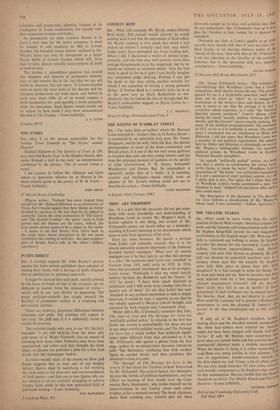THOU ART PIERPOINT
SIR,—II is a pity that the Spectator did not get some- body with more knowledge and understanding of Wyndham Lewis to review Mr. Wagner's book. A hostile opinion is one thing, but several of Mr. O'Donnell's points are based either on a misunder- standing of Lewis's meaning or on inaccuracies which seem to arise from ignorance of his work.
Here are some instances. He quotes a passage from Lewis and solemnly remarks that it is 'an almost uncannily accurate expression of the National Socialist mental amalgam.' What sort of mental amalgam can it he that fails. to see that this passage is a joke? He maintains that Lewis was 'attached' to Fascism from 1931 until early in 1939. In 1934, when this presumed 'attachment' was at its strongest, Lewis wrote : 'Politically I take my stand exactly midway between the Bolshevist and the Fascist.' In 1937 he wrote: 'I have been much deceived in politicians, and I will never write another line for or against any of them.' To say that Lewis' was ever 'attached' to any political movement as such is simply incorrect. It would be true, I suppose, to say that he was wholly opposed to Western Liberal thought, and attracted by both Fascist and Communist ideas.
Wilder still is Mr. O'Donnell's statement that Tarr, The Apes of God and The Revenge for Love are 'politically guided satires.' In relation to the first two books the remark is unintelligible, for these are not in any sense overtly political works; and The Revenge for Love has a social (rather than political) signifi- cance quite different from that attributed to it by Mr. O'Donnell, who quotes a phrase from the first page, spoken by an unimportant character (whom he calls 'The Showman,' confusing him with another figure in another book), and then attributes this character's views to Lewis.
The 'message' of The Revenge for Love is the reverse of that desire for 'freedom to hate' discovered by Mr. O'Donnell. The central figures, two innocents, become the victims of political machinations, and are killed; on learning of their deaths even the Com- munist Party functionary, who prides himself on his imperviousness to any feeling about such catas- trophes, is for a moment moved. The book expresses, more than anything else, Lewis's pity for these THE SPECTATOR, JULY 1 9 , 1951 innocents caught up in ideas and activities that they do not understand : Mr. O'Donnell's view of it as plea for freedom to hate cannot for a moment be sustained.
accords more closely with that of your art critic, la Basil Taylor, in his moving obituary notice of the 'enemy of the rose,' than with that of Mr. O'Donnell. Obviously my view of Lewis's quality as an artist I am not objecting to the hostility of his criticism however, but to the ignorance and, yes, stupidity
[Mr. Donat O'Donnell writes: 'The evidence is overwhelming that Wyndham Lewis was a Fascist sympathiser until shortly before the war. The passage quoted by me is a hyperbolic assertion; such asser- tions can be taken as "jokes" or as exaggerated revelations of the writer's ideas and desires. In this case it seems to me that the passage is in fact a revelation which expresses, as 1 said. "the National Socialist mental amalgam." Lewis's phrase about taking his stand "exactly midway between the Bol- sheviks and the Fascists" means exactly nothing. like, many of his political pronouncements. His statement in 1937, as far as it is verifiable, is untrue. The attach' ment I mentioned was an attachment to Hitler and Hitlerism. I did not assert that Wyndham Lewis was a member of any political organisation. His admira- tion for Hitler and Hitlerism is abundantly on record. Mr. Wagner's bibliography includes, for examcole, political articles by Wyndham Lewis in German National Socialist pamphlets.
'As regards "politically guided" satires, my point was that a satirist •in condemning the worse necer sarily claims to know the better. Wyndham Lewis's conception of "the better" was politically formulated. It is not a question of overt political content, nor did I claim that it was. Nor again did I claim that any of Wyndham Lewis's works constituted a plea "lot freedom to hate." Indeed I do not know what such a plea could mean.
'My description of the character in The Revenge for Love follows a classification of Mr. Wagner's. whose book I was reviewing.'—Editor, Spectator.] THE THEATRE STAKES














































 Previous page
Previous page